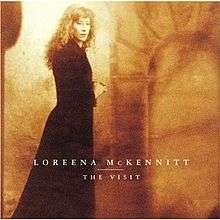The Visit (Loreena McKennitt album)
| The Visit | ||||
|---|---|---|---|---|
 | ||||
| Studio album by Loreena McKennitt | ||||
| Released | 1991 | |||
| Genre | Folk, world | |||
| Length | 49:10 | |||
| Label | Quinlan Road, Warner Bros. | |||
| Loreena McKennitt chronology | ||||
| ||||
| Professional ratings | |
|---|---|
| Review scores | |
| Source | Rating |
| Allmusic | |
The Visit is the fourth studio album by Loreena McKennitt. Released in 1991, the album has been certified Gold in the US. It was produced by Brian Hughes and Loreena McKennitt.[2]
Track listing
All songs written by Loreena McKennitt except as noted.[3][4]
- "All Souls Night" – 5:09
- "Bonny Portmore" (traditional, arr. McKennitt) – 4:21
- "Between the Shadows" – 3:42
- "The Lady of Shalott" (lyrics by Alfred, Lord Tennyson adapted by McKennitt, music by McKennitt) – 11:34
- "Greensleeves" (traditional arr. McKennitt) – 4:26
- "Tango to Evora" – 4:10
- "Courtyard Lullaby" – 4:57
- "The Old Ways" – 5:44
- "Cymbeline" (lyrics by William Shakespeare, music by McKennitt) – 5:07
Song information
- "All Souls Night" derives from McKennitt's merging of the traditions, mythology, and culture of Japan with old Celtic Samhain rituals. The "bonfires" and "figures dancing" are European, the "candles and lanterns" are from Japanese traditions.
- "Bonny Portmore" is a traditional Celtic folk song about oak forest deforestation. It was featured in the soundtrack of Highlander III: The Sorcerer (as well as "Cé Hé Mise le Ulaingt?" and "The Two Trees" from the album "The Mask and Mirror").
- "The Lady of Shalott" is based on the poem The Lady of Shalott by Alfred, Lord Tennyson.
- Contrary to the album notes, "Greensleeves" was not actually written by Henry VIII.
- "Tango to Evora" was used in the National Film Board of Canada documentary The Burning Times. A cover to the song has been recorded by one of Greece's most popular and respected singers, Haris Alexiou, entitled "Nefeli's Tango", with lyrics written by herself. Another cover to the song has been recorded by Turkish singer, Nilüfer, entitled "Çok Uzaklarda". Evora is a historical city in Portugal. The song has also been covered by the Iranian singer Ilya Monfared under the title "Gol-e-Orkideh" (Orchid Flower). There is also a Finnish cover, entitled "Katkennut Helminauha" by Finnish singer, Anneli Saaristo and a German cover by Bettina Wegner under the title "Alles was ich wünsche". The Kurdish cover was by Homar Dizayî, under the title "Xozga". There is an Albanian cover, too, entitled "Rrugës i trishtuar" (known also with the title "Sonata"), by the Albanian popular singer Eli Fara.
- "Cymbeline" is taken from a song in the William Shakespeare play Cymbeline.
Personnel
- Loreena McKennitt – synthesizer, piano, harp, accordion, bodhran, vocals, arranger, producer, adaptation
- Anne Bourne – cello
- Al Cross – drums
- Tom Hazlett - bass
- Brian Hughes – balalaika, electric & acoustic guitar, assistant engineer, assistant producer
- Patrick Hutchinson – uillean pipes
- George Koller – bass, cello, mad fiddle, tamboura, sitar
- Rick Lazar – percussion, udu drum
- Hugh Marsh – fiddle
Other personnel
- Jeff Wolpert – engineer, mixing, assistant producer
Certifications
References
- ↑ Allmusic review
- 1 2 "RIAA certification for "The Visit" Album". The Recording Industry Association of America. June 16, 1997. Retrieved February 20, 2012.
- ↑ CD liner notes
- ↑ "Explore the Music: Loreena McKennitt - The Visit". Quinlan Road. Retrieved 14 January 2012.
- ↑ "Associaусo Brasileira de Produtores de Disco". ABPD. 2012-01-19. Archived from the original on July 17, 2011. Retrieved 2012-02-20.
This article is issued from Wikipedia - version of the 9/10/2016. The text is available under the Creative Commons Attribution/Share Alike but additional terms may apply for the media files.